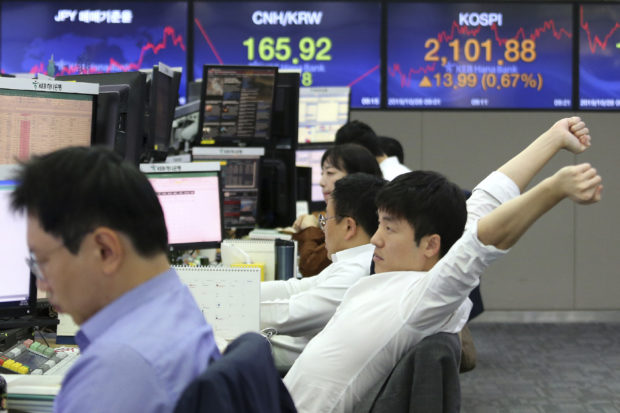BEIJING — Asian stock markets followed Wall Street higher Monday as investors looked ahead to a crowded week of corporate earnings, a possible U.S. interest rate cut and other potentially market-moving events.

A currency trader stretches at the foreign exchange dealing room of the KEB Hana Bank headquarters in Seoul, South Korea, Monday, Oct. 28, 2019. (AP Photo/Ahn Young-joon)
Benchmarks in Shanghai, Tokyo and Hong Kong all rose as fears about U.S.-Chinese trade tension and Brexit receded.
Markets shrugged off soft earnings from U.S. companies including Boeing and Caterpillar. Some 160 more companies are due to announce this week including Alphabet, Apple, Facebook, General Electric and Exxon Mobil.
The Shanghai Composite Index rose 0.7% to 2,975.60 and Tokyo’s Nikkei 225 gained 0.3% to 22,861.59. Hong Kong’s Hang Seng added 1.2% to 26,989.02.
South Korea’s Kospi was up 0.4% at 2,095.45 and Australia’s S&P-ASX 200 gained 0.1% to 6,747.90. Taiwan advanced while markets in New Zealand, Singapore and India were closed for holidays.
On Wall Street, the benchmark S&P 500 index closed Friday within 0.1% of its all-time high on July 26.
The S&P 500 rose 0.4% to 3,022.55 and the Dow Jones Industrial Average gained 0.6% to 26,958.06. The Nasdaq climbed 0.7% to 8,243.12.
Investors are looking to the Federal Reserve for another U.S. interest rate cut this week. Central banks in Japan and Canada also are due to announce interest rate decisions.
The U.S. Treasury is due to report which governments are deemed to manipulate their currencies to boost exports, a designation that can trigger penalties. A watch list issued in May included China, Japan and Germany.
This will be “one of the most substantial data and event risk weeks of the year,” said Jeffrey Halley of Oanda in a report. “Stock markets and energy will likely be punished should earnings or data from the U.S. or China disappoint.”
Investor attention shifted to corporate earnings as tension eased after Washington and Beijing resumed negotiations.
Both sides have imposed tariffs on billions of dollars of each other’s goods. The 15-month-old conflict has battered factories and farmers on both sides and spurred fears the global economy might tip into recession.
On Monday, Vice President Mike Pence is due to deliver a speech on U.S.-China relations amid tension over protests in Hong Kong.
Investors expect the Fed to cut its benchmark rate by 0.25% following signs of U.S. economic weakness.
Also, markets are watching a monthly Chinese manufacturing indicator due out Friday for signs of whether economic growth is weakening further after slowing to a three-decade low in the quarter ending in September.
On Sunday, the government reported profits at China’s biggest industrial companies declined by a bigger-than-expected 2.1% from a year earlier in the first nine months of 2019. Profit at state-owned companies fell 9.6% while it rose 5.4% at private enterprises.
In Europe, the other 27 EU governments agreed Friday to grant Britain’s request for an extension to its Oct. 31 deadline to leave the trade bloc. But they failed to settle on how long that delay might be.
British politicians want to know the length of the delay before deciding whether to hold an early election. The EU, meanwhile, wants to know what Britain plans to do with the extra time.
ENERGY: Benchmark U.S. crude lost 14 cents to $56.52 per barrel in electronic trading on the New York Mercantile Exchange. The contract added 43 cents on Friday to close at $56.66. Brent crude, used to price international oils, shed 13 cents to $61.60 per barrel in London. It rose 34 cents the previous session to $61.73.
CURRENCY: The dollar advanced to 108.75 yen from Friday’s 108.66 yen. The euro gained to $1.1082 from $1.1080./gsg